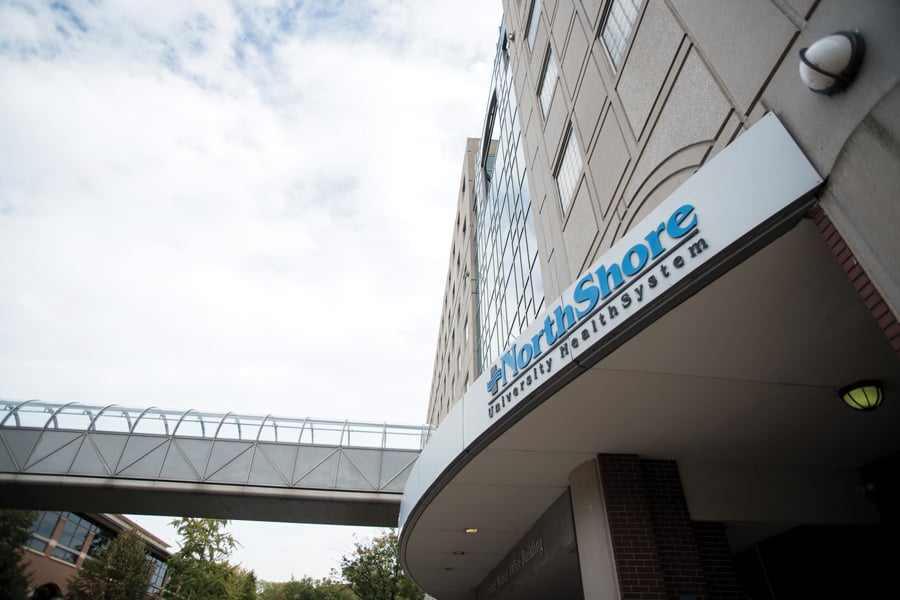Undocumented Evanston residents face financial, medical struggles without government aid
Daily file photo by Colin Boyle
NorthShore University HealthSystem. NorthShore testing sites do not ask patients about their immigration status.
May 21, 2020
Battling hunger, fear and financial strain, undocumented immigrants in Evanston are relying on local relief efforts to make ends meet during COVID-19.
As federal stimulus checks provide relief to 140 million Americans and applications for unemployment benefits and food stamps soar, undocumented residents remain ineligible for government aid.
“We don’t question when undocumented families file taxes and pay taxes and contribute every day,” said Viridiana Carrizales, CEO and Co-Founder of ImmSchools. “We don’t question their immigration status, we take their money. It is truly infuriating that now that those families need help, we’re forgetting about them.”
Teri Ross, executive director of Illinois Legal Aid Online, said traffic on the website has “exponentially” increased since the start of the pandemic. State Sen. Celina Villanueva (D-Chicago) said undocumented residents are looking to community organizations and churches for help.
One such organization, Evanston Cradle to Career, is providing the undocumented community with information on local food pantries. C2C also gave $500 each to almost 60 local families who did not qualify for the federal stimulus check, said Tania Margonza, who worked to distribute the financial aid with C2C.
“Some people got emotional, but they were all grateful,” Margonza said. “They said, ‘This is what I’m struggling with, I’m behind on bills (and) the funds that you’re providing are going to help me.’”
According to the Migration Policy Institute, around six million foreign-born workers serve in industries hollowed out by the pandemic job cuts. An additional six million are employed on the pandemic’s front lines, working in areas like the food and cleaning industries.
Since undocumented workers are overrepresented in essential industries, they are at high risk of exposure to the virus. But health care is less accessible for these workers. Unless pregnant, undocumented residents are ineligible for Medicare or Medicaid.
Some free and low-cost clinics like Access Health Evanston provide services to undocumented immigrants on sliding-fee scales, giving patients discounts based on their income.
Angie Morales, manager of Access Health Evanston, said the clinic does not ask patients about their immigration status. Erie Evanston-Skokie Health Center and NorthShore testing sites follow the same practice.
Even when medical care is affordable, undocumented residents may be afraid to seek treatment. Nancy Jodaitis, director of higher education at Immigrants Rising, said undocumented families are concerned that receiving low-cost treatment will be included in their public charge, which is the way the government tracks public benefits used by non-citizens to determine if they will be a financial burden.
Though US Citizenship and Immigration Services said seeking treatment for COVID-19 will not count in future public charge analysis, Jodaitis said undocumented immigrants are still wary.
“Some people are fearful that there might be some kind of negative retribution if they’re able to try to go forward and get well,” Jodaitis said.
Additionally, Julia Albarracin, executive director of Western Illinois DREAMers, said some undocumented residents are staying home instead of seeking medical help because they are afraid to be asked about their immigration status.
Jose Lopez, office director for the legal aid service Mil Mujeres Chicago, said being caught is a constant fear for many undocumented immigrants.
“At any moment, an (Immigration and Customs Enforcement) raid could occur at work,” Lopez said. “Or they’re at the wrong place at the wrong time, they’re asked for the documentation, and they could be in prison. Imagine that fear is multiplied, knowing that the whole family is resting on their shoulders, and they’re not seeing any support.”
While many undocumented residents cannot receive government aid, Deferred Action for Childhood Arrival recipients with work authorization are eligible for unemployment benefits. They can also receive federal stimulus checks if they meet tax and income requirements. However, those with DACA status are not eligible for Medicare or Medicaid.
Alongside local advocates, some advocates at the state and national level are also working to support undocumented residents.
Evanston Latinx Business Alliance president Linda Del Bosque is working with U.S. Rep. Jesús “Chuy” García (D-Chicago) to advocate for the HEROES act, which would provide government aid to all tax-paying immigrants regardless of their status.
The U.S. House passed the HEROES Act last week, but it’s unlikely the Senate will pass the bill. Villanueva said she and other state legislators have been urging members of Congress to include undocumented individuals in any future stimulus package they write.
“It’s important to make sure that we’re fighting for that, and that we’re getting that in whatever next stimulus bill is going to come out of Congress and be signed by the administration,” Villanueva said. “But we’ve also got to fight back against the administration for trying to scapegoat immigrants during this time.”
She said on the state level, the Illinois Legislative Latino Caucus has been pushing for the governor to do more to support undocumented communities.
Many have noted the pandemic has highlighted societal inequities and challenges for undocumented residents, but ImmSchools Co-Founder Carrizales said the fear and uneasiness facing these families was present before COVID-19.
“Just like how everyone is feeling this uncertainty of the pandemic, that’s the uncertainty that our families have lived their entire lives in this country, being undocumented,” Carrizales said.
Correction: A previous version of this article misstated Linda Del Bosque’s position at Latinx Business Alliance. She is the president, not the owner. The Daily regrets the error.
Email: [email protected], [email protected]
Twitter: @anika_mittu, @delaneygnelson












